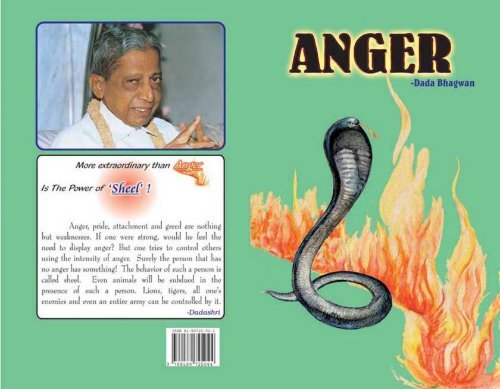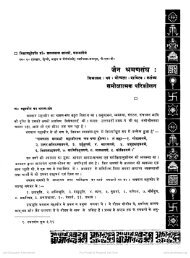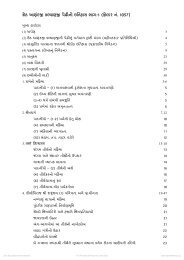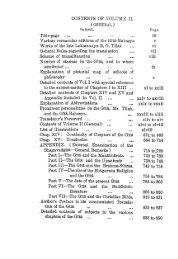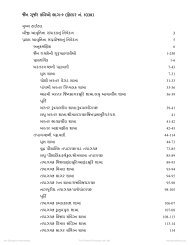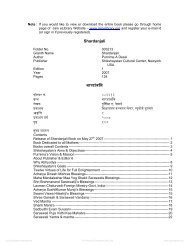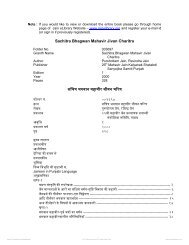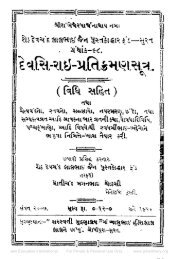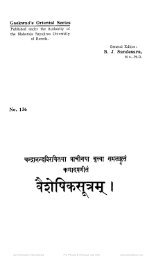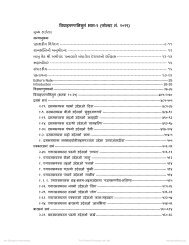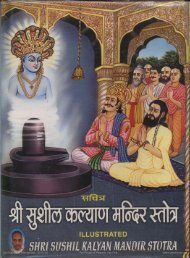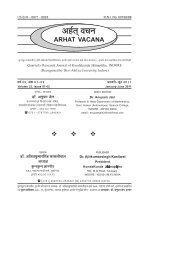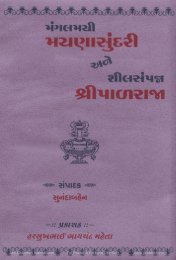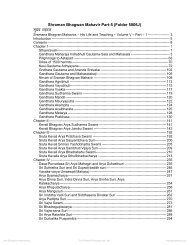Anger - Jain Library
Anger - Jain Library
Anger - Jain Library
Create successful ePaper yourself
Turn your PDF publications into a flip-book with our unique Google optimized e-Paper software.
LMMMMMMN<br />
O<br />
W<br />
O<br />
W<br />
O<br />
W<br />
O<br />
W<br />
<strong>Anger</strong><br />
O<br />
W<br />
O<br />
W<br />
O<br />
W<br />
O<br />
W<br />
O<br />
W<br />
O<br />
Editor : Dr. Niruben Amin<br />
W<br />
QRRRRRRS<br />
Publisher : Mr. Ajit C. Patel on behalf of<br />
Dada Bhagwan Foundation<br />
5, Mamatapark Society,<br />
B/h. Navgujarat College,<br />
Usmanpura, Ahmedabad-380014.<br />
Tel. : (079) 7543979, 7540408<br />
E-Mail : dadaniru@vsnl.com<br />
© : Editor.<br />
Edition : 3000 copies, 2001<br />
Price<br />
Printer<br />
: Ultimate Humality<br />
(leads to Universal oneness)<br />
AND<br />
Awareness of "I Don't Know Anything"<br />
Rs. 5.00<br />
: Mahavideh Foundation (Printing Division),<br />
Dhobighat, Dudheshwar,<br />
Ahmedabad - 380 004.<br />
Tel. : 5629197
PREFACE<br />
<strong>Anger</strong> is a weakness but people think of it as strength.<br />
The person who does not display anger has more inner strength<br />
than the one who displays it.<br />
One usually becomes angry when things do not go his<br />
way, or when the other person does not understand him or<br />
when there is a difference of viewpoint. Many a time we<br />
become angry when we are accused of being wrong when we<br />
think we are right. We think that we are right because of our<br />
perception, and the other person thinks that he is right. Often,<br />
it is when we have no idea of what to do next, have no foresight<br />
or intuition, that we become angry.<br />
We become angry when we are insulted, incur a loss,<br />
protecting our pride or greed. If one is to become free from<br />
pride and greed, one needs to have awareness. What happens<br />
if the servant were to break a china tea set? If your son-inlaw<br />
were to do the same thing, would you not control your<br />
anger? Therefore, it is dependant on circumstances.<br />
and bind vengeance against us, so that in our next life we will<br />
have to suffer the consequences.<br />
When parents become angry with their children and<br />
when a guru becomes angry with his disciples, they bind punya<br />
(merit karma). This is because their aim is to improve their<br />
children and disciples respectively. If one were to do it for<br />
selfish reasons then he would bind paap (bad karma). This is<br />
the teaching of the Enlightened Ones.<br />
<strong>Anger</strong>, the subject dealt with in this book, is the most<br />
troublesome and overt of all inner human weaknesses. It is<br />
discussed extensively for clear understanding. It is our sincere<br />
hope that the readers will find this helpful in their endeavor<br />
to free themselves from the severe grip of anger.<br />
- Dr. Niruben Amin<br />
<strong>Anger</strong> can only disappear if one understands that if<br />
someone ruins him, that person is merely a nimit (person<br />
instrumental in delivering the effects of his past karma) and<br />
that what one is experiencing is the result of his past life’s<br />
karma.<br />
We should be aware whenever and wherever we<br />
experience anger. When someone is hurt by our anger, we<br />
should repent and ask for their forgiveness and resolve never<br />
to get angry again. We must do this because the person we<br />
become angry towards will be hurt and will harbor a grudge
NOTE ABOUT THIS TRANSLATION<br />
Ambalal M. Patel, Gnani Purush, also commonly known<br />
as Dadashri or Dada, always used to say that it is not possible<br />
to exactly translate his satsang about the Science of Self-<br />
Realization and the art of worldly interaction into English.<br />
Some of the depth of meaning would be lost. He stressed the<br />
importance of learning Gujarati to precisely understand all<br />
his teachings.<br />
Dadashri did however grant his blessings to convey his<br />
teachings to the world through translations in English and<br />
other languages.<br />
This is a humble attempt to present to the world the<br />
essence of the teachings of Dadashri, the Gnani Purush. A lot<br />
of care has been taken to preserve the tone and message of<br />
the satsang. This is not a literal translation of his words. Many<br />
people have worked diligently for this work and we thank<br />
them all.<br />
This is an elementary introduction to the vast treasure<br />
of his teachings. Please note that any errors encountered in<br />
the translation are entirely those of the translators.<br />
Introduction of ‘The Gnani’<br />
One June evening in 1958 at around six o’clock,<br />
Ambalal Muljibhai Patel, a family man and contractor by<br />
profession, was sitting on a bench of platform number three<br />
at Surat train station. Surat is a city in south Gujarat, a western<br />
state in India. What happened within the next forty-eight<br />
minutes was phenomenal. Spontaneous Self-realization<br />
occurred within Ambalal M. Patel. During this, his ego melted<br />
totally and completely. From that time, onwards he became<br />
completely detached from all thoughts, speech and acts of<br />
Ambalal and he became a living instrument of The Lord for<br />
salvation of the world through the path of knowledge. He<br />
called this Lord, Dada Bhagwan. “This Lord is fully<br />
manifested within me,” he told, to all he met. Furthermore,<br />
he added that, “The same Lord, Dada Bhagwan exists in all<br />
living beings.” The difference between you and me is that in<br />
me The Lord has manifested fully and in you he is yet to<br />
manifest. ‘ Who are we? What is God? Who runs this world?<br />
What is karma? What is liberation? etc. All the world’s<br />
spiritual questions were answered. Thus, nature offered<br />
absolute vision to the world through the medium of Shree<br />
Ambalal Muljibhai Patel.<br />
Ambalal was born in Tarasali a suburb of the city of<br />
Baroda and raised in Bhadran, Central Gujarat. Although a<br />
contractor by profession, and married to Hiraba, his life at<br />
home and with the world was exemplary prior to his Self<br />
Realisation. After becoming, Self realized and attaining the<br />
state of a Gnani, (The Awakened One, Jnani in Hindi) his<br />
body became a public charitable trust.<br />
Throughout his whole life, he lived by the principle
that there should not be any business in religion, but in all<br />
business, there must be religion. In addition, he never took<br />
any money from anyone for his own use. He used the profits<br />
from his business to take his devotees for pilgrimage in various<br />
parts of India.<br />
His words became the foundation for a new, direct<br />
and step less path to realization called Akram Vignan. Through<br />
his divine, original scientific experiment (The Gnan Vidhi)<br />
he imparted this knowledge to others within two hours.<br />
Thousands have received his grace through this process and<br />
thousands continue to do so even now. He called it Akram<br />
Vignan (Step less Science, elevator path). Akram means<br />
without steps and kram means to rise step by step. Akram<br />
means lift or elevator path. Kram here means orderly, stepby-step<br />
spiritual progress. Akram is now recognized as a direct<br />
shortcut to the bliss of the Self.<br />
Who is Dada Bhagwan?<br />
When he explained others who ‘Dada Bhagwan’ is<br />
he would say :<br />
“What you see in front of you is not ‘Dada<br />
Bhagwan’. What you see is ‘A.M.Patel.’ I am a Gnani<br />
Purush and the Lord that is manifested within, is ‘Dada<br />
Bhagwan’. He is the Lord within. He is within you and<br />
everyone else. He has not yet manifested within you,<br />
whereas within me he is fully manifested. I myself am<br />
not a Bhagwan. I bow down to the Dada Bhagwan within<br />
me.’’<br />
Current link for attaining the knowledge of<br />
Self realization (Atmagnan)<br />
“I am personally going to impart siddhis (special spiritual<br />
powers) to a few people. After I leave, will there not be a need<br />
for them? People of future generations will need this path, won’t<br />
they?” - Dadashri<br />
Param Pujya Dadashri used to go from town to town and<br />
country-to-country to give satsang and impart the knowledge of<br />
the Self as well as knowledge of harmonious worldly interaction<br />
to all whom came to see him. In his final days in late 1987, he<br />
graced Dr. Niruben Amin with the siddhis (special spiritual<br />
powers) to continue his Work.<br />
After Param Pujya Dadashri left his mortal body on<br />
January 2, 1988. Dr. Niruben continues his Work, travelling within<br />
India to cities and villages; and going abroad to the USA, Canada,<br />
UK and Africa. She is Dadashri’s representative of Akram Vignan.<br />
She has been instrumental in expanding the key role of Akram<br />
Vignan as the simple and direct path to Self Realization for modern<br />
times. Thousands of spiritual seekers have taken advantage of<br />
this opportunity and are established in the experience of pure<br />
Soul while carrying out their worldly duties. They experience<br />
freedom, here and now while living their daily life.<br />
Powerful words in scriptures help the seeker in increasing<br />
their desire for liberation and thus they represent the path. The<br />
knowledge of the Self is the final goal of all seekers. Without the<br />
knowledge of the Self there is no liberation. This knowledge of the<br />
Self (Atmagnan) does not exist in books. It exists in the heart of a<br />
Gnani. Hence, the knowledge of the Self can only be acquired by<br />
meeting a Gnani. Through the scientific approach of the Akram<br />
Vignan, even today one can attain Atma Gnan, but it can only occur<br />
by meeting a living Atma Gnani and receiving the Atma Gnan<br />
(Knowledge of The Self). Only a lit candle can light another candle !
Other Books of "DADASHRI"<br />
(1) Who Am I: "Who am I" is a burning question since the<br />
beginning of our being in the universe. Answer to it is here...<br />
(2) Ultimate Knowledge: Experience of a 16 year youth about<br />
Atma Gnan.<br />
(3) Generation Gap (Ma-Baap Chockra no Vyavhar): How<br />
to overcome the generation gap in the west? How to raise<br />
children? What are Parents & childs duties.<br />
(4) The Essence of all Religion: The essence of all religions in<br />
Nine Sentences with Scientific understanding.<br />
(5) Adjust Everywhere: A simple key to solve day to day<br />
problems in life.<br />
(6) Avoid Clashes: Just these two words, followed to the hilt will<br />
liberate you. You do not need to study any scriptures. This is the<br />
guarantee of the Gnani Purush Dadashri.<br />
(7) The Fault of the sufferer: We are bound by our mistakes.<br />
The world has not bound us. Once these mistakes are eliminated,<br />
we are free.<br />
(8) Whatever has happened is justice: When you understand<br />
"whatever happens is justice" you will solve all your worldly<br />
problems. There is no injustice in this world even for a moment.<br />
Justice will prevail.<br />
(9) Worries: The Gnani Purush Dadashri dissects the nature of<br />
worry and shows the way to be free from worry forever. Without<br />
this understanding it is very difficult to resolve the problem of<br />
worry at its root.<br />
(10) <strong>Anger</strong>: <strong>Anger</strong>, pride, attachment and greed are all weaknesses.<br />
Gnani Purush Dadashri shows the way to overcome such<br />
weaknesses and live a life free of conflict.<br />
(11) Harmony in marraige (Pati-Patni no Divya Vyavhar):<br />
Couples who marry often find themselves at odds with each<br />
other and suffer difficulties in their life together. The Gnani<br />
Purush Dadashri shows profound reasons for clashes between<br />
couples in our society and offers the way to harmony and bliss.<br />
ANGER<br />
WHO ACCEPTS THAT HE IS WRONG?<br />
Questioner : When we are right and someone makes<br />
us out to be wrong we become angry with him. How can<br />
we stop from getting angry?<br />
Dadashri : Yes, but only if you are right. Are you<br />
really right? Do you know that you are right?<br />
Questioner : Our soul tells us that we are right.<br />
Dadashri : In this situation, you are the judge, the<br />
lawyer and the culprit. Then of course you are going to be<br />
right, you will not allow yourself to be wrong. The other<br />
person will think that he is right. Do you understand?<br />
THESE ARE ALL WEAKNESSES<br />
Questioner : Is it not good to feel an aversion towards<br />
injustice? Are we not justified in feeling angry when we<br />
clearly see injustice?<br />
Dadashri : <strong>Anger</strong> and hatred are weaknesses. The
2 <strong>Anger</strong> <strong>Anger</strong> 3<br />
whole world has these weaknesses. Do you get angry if<br />
someone scolds you?<br />
Questioner : Yes I do.<br />
Dadashri : So is that a weakness or strength?<br />
Questioner : In certain situations it is necessary to<br />
become angry.<br />
Dadashri : No, no. <strong>Anger</strong> is a weakness. To say that<br />
anger is necessary in certain situations is a worldly notion.<br />
People make such statements because they are not able to<br />
get rid of their anger.<br />
A PERSON IS STRONG WHEN HE REMAINS<br />
UNAFFECTED<br />
Questioner : Would it not be considered cowardly to<br />
remain silent when someone insults you?<br />
Dadashri : Not at all. To bear an insult is a sign of<br />
great strength. If someone were to swear at me right now,<br />
I would not have a single negative thought towards him.<br />
That is strength. All quibbling and quarrelling is weakness.<br />
To bear an insult calmly is a great strength. When such an<br />
insult is overcome just once, if one step is crossed in this<br />
manner, then you will get the strength to cross a hundred<br />
such steps. Do you understand? If the opponent is strong<br />
then the other party will become weak. That is the natural<br />
trend. When a weak person harasses us and we do not do<br />
anything in response, it is considered a great strength.<br />
In fact the weak should be protected and the strong<br />
people should be confronted. In this current time cycle, no<br />
such people are to be found. Nowadays people keep<br />
badgering the weak and run away from the strong. There<br />
are very few people that protect the weak and stand up<br />
against the strong. This whole world keeps hurting the weak.<br />
At home the husband dominates the wife. If you beat a cow<br />
that is tied up, where will she go? What if you were to untie<br />
the cow and then beat her? She would either run away or<br />
fight back.<br />
A man who, despite being strong, does not harm his<br />
opponents, not even his enemy, is considered a powerful<br />
person. Is it not cowardliness when you get angry with<br />
someone who gets angry with you? I am saying that these<br />
inner enemies of man: anger, pride, attachment and greed<br />
are weaknesses. Why would a person who is strong need to<br />
get angry? People, however, try to control others with their<br />
anger. Those who do not use anger as a weapon have<br />
something else. That something else is sheel(extraordinary<br />
moral character). Sheel in a person subdues even animals.<br />
Lions, tigers and enemies will all surrender to such a person.<br />
THE ANGRY MAN IS A WEAKLING<br />
Questioner : But Dada, what should we do when<br />
someone gets angry with us?<br />
Dadashri : They will get angry. Is it under their<br />
control? Their inner machinery is not under their control. If<br />
it were under their control they would not let the machine<br />
overheat. To become even the slightest bit angry is like<br />
becoming a beast. One becomes transformed from a human<br />
being into a beast. People would not let such a thing happen,<br />
but what can they do when it is not under their control?<br />
The world is such that there is no reason at any given
4 <strong>Anger</strong> <strong>Anger</strong> 5<br />
time for any anger to take place. Even when children do not<br />
listen, there is no reason to become angry. Here you have<br />
to handle the situation by remaining calm. To become angry<br />
is a terrible weakness. <strong>Anger</strong> is the worst weakness of all.<br />
You should be sympathetic towards the person who becomes<br />
angry and understand that he does not have any control in<br />
this matter. You should feel compassion for the person who<br />
has no control over himself.<br />
What does it mean to become angry? It is like setting<br />
fire to oneself and then setting others on fire. Once this<br />
match is struck, he burns in the flames and then destroys<br />
the other person. Therefore, if getting angry were under<br />
one’s control, one would not get angry. Who likes to burn?<br />
If someone tells me that anger is necessary in this world, I<br />
would tell him there is never a reason for anger. <strong>Anger</strong> is<br />
a weakness and that is why it happens spontaneously. God<br />
has called it a weakness. God has said that a real man (Selfrealized)<br />
is the one who has no weakness of ego, anger,<br />
greed or attachment at all. These men that you see around<br />
you are weaklings, because they have no control over their<br />
anger and they do not know how to deal with it. <strong>Anger</strong>, ego,<br />
attachment and greed are all obvious weaknesses. Can you<br />
not feel your body tremble when you get angry?<br />
Questioner : Even the body is saying that anger is<br />
not good.<br />
Dadashri : Yes even the body tells us that it is wrong,<br />
when it trembles. Therefore, one should consider anger as<br />
a great weakness.<br />
PERSONALITY WITHOUT WEAKNESS OF ANGER<br />
Questioner : If we see a man beating a child, should<br />
we not voice our anger at him?<br />
Dadashri : He will not stop the beating even if you<br />
do get angry. Why would you get angry with him? He may<br />
beat you too. Talk to him calmly and explain to him that it<br />
is a weakness to react in anger.<br />
Questioner : Should we let him continue to beat the<br />
child?<br />
Dadashri : No, but you should ask him why he is<br />
beating the child. Try to make him understand. If you get<br />
angry with him, then this anger is your weakness. First and<br />
foremost you should not have the weakness within you.<br />
Those that do not have any weaknesses, have impressive<br />
personalities. When such people utter even a single word,<br />
everyone will listen to them readily.<br />
Questioner : Perhaps they may not.<br />
Dadashri : They would not listen to you because you<br />
are weak and lack personality. There should not be any<br />
weakness. One should have good conduct. One must have<br />
a personality. Even thugs will run away at the sight of such<br />
a person. No one will run away from an angry person. On<br />
the contrary they may even beat him up. The whole world<br />
strikes at the weak.<br />
When can one acquire such a personality? He will<br />
acquire such a personality when he understands the spiritual<br />
science of the Self. In this world the relative knowledge gets<br />
forgotten, whereas the science of the Self remains with you.<br />
FROST IS MORE DEADLY THAN HEAT<br />
When there is frost or an ice storm, it gets so cold
6 <strong>Anger</strong> <strong>Anger</strong> 7<br />
that it burns the grass, the trees, and all the crops. Why do<br />
you think everything burns when it gets cold?<br />
Questioner : Everything burns because of extreme cold.<br />
Dadashri : Yes, so if you live calmly and remain<br />
cool, you will become more effective.<br />
DIGNITY WHERE ANGER CEASES<br />
Questioner : But Dada, is it not a weakness to be too<br />
calm?<br />
Dadashri : We have to remain within limits. That is<br />
called normality. “Below normal is the fever, above normal<br />
is the fever, and ninety-eight is the normal”. Therefore, only<br />
normality is required.<br />
People are more afraid of those who do not get angry<br />
as opposed to those who do. Why is it so? It is because one<br />
develops inner strength when anger ceases. This is the law<br />
of nature. Otherwise there would be no one to protect such<br />
people. People use anger as a form of protection. In<br />
ignorance (ignorance of one’s real Self), one’s protection is<br />
through anger.<br />
IRRITABLE PEOPLE ALWAYS LOSE<br />
Questioner : Reasonable annoyance or reasonable<br />
anger, is it not good?<br />
Dadashri : What do people call that? It is foolish to<br />
become irritated. Irritation is considered a weakness. If we<br />
ask the children, what their father is like, they would say<br />
that he is a very cranky person. Does this not discredit the<br />
father’s reputation?<br />
If you ask a child whom does he likes the best in his<br />
family, he would say that he likes his mother the most<br />
because she does not get angry. The father undoubtedly<br />
comes last on his list because the father always gets angry.<br />
I would remind him that it is his father who provides<br />
everything for him, yet even then is he not the favorite. And<br />
the child would shake his head. Now tell me, we work<br />
hard, we feed them, we bring home the money and give it<br />
to them, and yet even then we come last.<br />
ANGER IS BLINDNESS<br />
Questioner : What is the main reason behind a man’s<br />
anger?<br />
Dadashri : He loses sight. When one does not see the<br />
wall, he bumps into it. In the same way, he cannot see from<br />
within, which is why anger occurs. When he cannot see<br />
what lies ahead of him, anger overcomes him.<br />
ANGER OCCURS WHERE THERE IS<br />
LACK OF INSIGHT<br />
When does anger take place? It is when his vision<br />
(darshan) becomes obscured, and his knowledge (gnan) is<br />
obstructed. The same happens when a person is overcome<br />
with pride.<br />
Questioner : Please illustrate this point with an<br />
example.<br />
Dadashri : Do people not ask you why you get angry?<br />
You would tell them that it was because you could not think<br />
clearly. Yes it is when people cannot think clearly that they<br />
get angry. Would they get angry if they were able to think?
8 <strong>Anger</strong> <strong>Anger</strong> 9<br />
How are you rewarded when you get angry? First the sparks<br />
set you on fire and then you burn others.<br />
THE FIRE OF ANGER BURNS ONESELF AND<br />
THEN OTHERS<br />
<strong>Anger</strong> is like putting a lighted match to one’s own<br />
home. <strong>Anger</strong> is setting fire to one’s own home filled with<br />
hay. First his own house burns and then the neighbor’s<br />
house.<br />
What happens when a single match is thrown onto a<br />
haystack in a field?<br />
Questioner : It will burn.<br />
Dadashri : It is the same with anger. Whatever he<br />
had earned in two years, he will destroy in an instant by<br />
getting angry. <strong>Anger</strong> is a live fire. The person himself will<br />
not realize that he has destroyed everything, because the<br />
damage is not visible on the outside, but everything from<br />
within is destroyed. Part of whatever he has accumulated<br />
for the next life is expended. What happens if more is<br />
exhausted? As a human, he eats bread but in his next life,<br />
as an animal, he will have to eat grass.<br />
No man in this world has conquer anger. <strong>Anger</strong> has<br />
two parts. One part comes as discord and the other as<br />
restlessness. Discord is apparent to others and restlessness<br />
remains within, unseen by others. It is the discord part of<br />
anger that one has overcome when one claims to have<br />
conquered anger. However, in fact, as one part is suppressed,<br />
the other part increases. When a person claims to have<br />
conquered anger, his pride increases. In reality, anger has<br />
not been completely conquered, but perhaps one can say<br />
that he has conquered the visible anger, discord.<br />
SULKING IS ANGER<br />
When a person sulks in anger, it is really anger itself.<br />
For example, if a husband and wife quarrel intensely in the<br />
night, so much anger is generated that they both lay awake<br />
restless, the entire night. In the morning the wife serves him<br />
tea by banging the teacup. The husband will then realize<br />
that she is still sulking. This is called anger. The sulking<br />
can last for any period of time. For some it may even be<br />
life-long. The father will not want to see the son’s face and<br />
the son will not want to see the father’s face. The sulking<br />
is apparent from the disgruntled look on one’s face.<br />
Sulking can be such that if someone were to insult me<br />
fifteen years ago, and I encounter him again today, the<br />
moment I lay eyes on him, I will remember everything from<br />
the past. That is taanton(the link of anger). Ordinarily<br />
people’s sulking never goes away. Even renowned ascetics<br />
and monks sulk. If you were to provoke them and challenge<br />
their authority, they would not speak to you for weeks. This<br />
is taanto.<br />
DIFFERENCE BETWEEN GUSSO (ANNOYANCE)<br />
AND KRODH (ANGER)<br />
Questioner : Dada what is the difference between<br />
annoyance and anger?<br />
Dadashri : <strong>Anger</strong> is associated with ego. When<br />
annoyance and ego get together, they result in anger. When<br />
a father gets annoyed with his children, it is not called<br />
anger, because it is not associated with the ego. <strong>Anger</strong> binds<br />
paap (bad karma), but the annoyance of a father will bind
10 <strong>Anger</strong> <strong>Anger</strong> 11<br />
punyas (positive karma), because he is thinking about the<br />
welfare of his children. <strong>Anger</strong> is accompanied by the ego.<br />
When you get annoyed, do you feel bad from within?<br />
There are two kinds of krodh, maan, maaya and lobh<br />
(anger, pride, attachment and greed).<br />
One kind you can divert – nivarya. If you get angry<br />
with someone then from within you divert that anger and<br />
calm it down. If one were able to reach this stage, his<br />
worldly interactions would become very pleasant.<br />
The other kind of anger is one that cannot be diverted<br />
- anivarya. One tries very hard but from within the explosion<br />
still occurs. Such anger is anivarya. This anger injures the<br />
person himself as well as others.<br />
God has allowed a certain level of anger for the sadhus<br />
(sages, monks) so that they may uphold the austerity of<br />
their conduct, as long as it does not hurt anyone. My anger<br />
can hurt only me and not anyone else. That much anger has<br />
been permitted.<br />
RECOGNIZE THE KNOWER<br />
Questioner : We all know that anger is bad, but still…<br />
Dadashri : It is like this: The one, who is angry, is<br />
not aware of the anger. The one, who is greedy, is not aware<br />
of his greed and the one who is arrogant is not aware of his<br />
pride. The ‘knower’ is completely separate from all these<br />
weaknesses. All these people feel that although they are<br />
aware of their weakness, then why do the weaknesses still<br />
occur?<br />
Now, who is it that says ‘I know’? They do not know<br />
the answer to this. They do not know who the ‘knower’ is.<br />
This is what one needs to discover. If one can find the<br />
‘knower’, then all the weaknesses will go. It can only be<br />
called true knowledge, when all the weaknesses are<br />
destroyed.<br />
KNOW THE CORRECT SOLUTION JUST ONCE<br />
Questioner : I still become angry even though I know<br />
that it is wrong to become angry. What is the solution?<br />
Dadashri : Who is it that knows? If you had the real<br />
knowledge just once, there would be no anger. But because<br />
you still become angry, it means that you do not know.<br />
There is ego in your saying that you know.<br />
Questioner : After getting angry I realize that I should<br />
not get angry.<br />
Dadashri : No, but after you know who the knower<br />
is, there would be no anger. Let us say, there are two identical<br />
bottles standing side by side and you are told that one has<br />
medicine in it and the other has poison in it. Now if you<br />
mistake one for the other, then you can conclude that you<br />
did not know. If you do not mistake the one for the other,<br />
then one can say that you do know. This would apply to<br />
anger as well. The reason you become angry is because you<br />
do not know. You are merely going around with ego when<br />
you say that you know. In darkness you are likely to bump<br />
into things, but when there is light and you can see clearly,<br />
you will not have any accidents. When we confuse the<br />
darkness with light, it is our own mistake. So come and sit<br />
in the Satsang with me and acquire the real knowledge.<br />
Then only will anger, pride, attachment and greed go away.
12 <strong>Anger</strong> <strong>Anger</strong> 13<br />
Questioner : But everyone gets angry.<br />
Dadashri : Ask this gentleman. He is saying no.<br />
Questioner : There will be no anger after coming to<br />
satsang.<br />
Dadashri : What kind of medicine do you think he<br />
took? It is a medicine that removes the root cause of anger.<br />
ONLY THROUGH RIGHT UNDERSTANDING<br />
Questioner : I get angry with people that are close to<br />
me. The other person may be right according to his<br />
viewpoint, but from my viewpoint I become very angry.<br />
What is the reason for my anger?<br />
Dadashri : If you are walking along and a stone from<br />
a building falls on your head and hurts you, will you get<br />
angry?<br />
Questioner : No, because it just happened<br />
spontaneously.<br />
Dadashri : No, but why do you not get angry in this<br />
situation? It is because you do not see anybody there. Who<br />
will you get angry with?<br />
Questioner : But no one has thrown the stone.<br />
Dadashri : And if you were to go out now and a little<br />
boy throws a stone at you, you will get angry with him.<br />
Why? Because you believe that the boy threw the stone at<br />
you. But if a stone rolls down a hillside and hits you, you<br />
will look around but you will not get angry.<br />
You become angry because in your mind you feel that<br />
a person is responsible. No one is able to hurt another person<br />
knowingly. Whether a boy throws a stone at you or whether<br />
a stone from a hilltop hits you, it is essentially the same<br />
thing. But it is an illusion that makes you perceive that<br />
someone is responsible for it. In this world no man has<br />
even the independent power over his bowel movements.<br />
We do have control over anger. When we realize that<br />
no one has thrown the stone that falls from the hillside, we<br />
do not get angry. And when you say, “<strong>Anger</strong> overcomes<br />
me”; it really does not. If it did, then why do you not react<br />
in the same way in the other situation? Why don’t you get<br />
angry when a policeman tells you off? And yet you get<br />
angry with your wife, with the children, with the neighbors,<br />
with those working under you. And why don’t you get angry<br />
with your boss? <strong>Anger</strong> does not just happen to people. People<br />
get angry because they want to have their own way.<br />
Questioner : How can one control it?<br />
Dadashri : The control is there. Recognize that the<br />
person who throws the stone at you is merely your nimit<br />
(someone instrumental) who is bringing to you, the effects<br />
of your past karma. When you see a stone falling from a<br />
hill, your anger does not arise. In the same manner, here too<br />
you should exercise control, because everything is just like<br />
the hill.<br />
If a car is coming head on to you, will you get angry<br />
or will you move out of the way? Would you crash with the<br />
car? You are aware of the consequences. But when you get<br />
angry, the internal destruction is much greater. The external<br />
destruction is obvious to you, but you are not aware of the
14 <strong>Anger</strong> <strong>Anger</strong> 15<br />
internal destruction. This is the only difference,<br />
RESULTS CHANGE WHEN CAUSES CHANGE<br />
Someone asked me why for countless lives man has<br />
tried to get rid of anger and has not succeeded. I told him<br />
that perhaps he did not have the right solution. He told me<br />
that the solutions given in the scriptures, which he himself<br />
was following, did not eradicate his anger. I told him that<br />
the solution has to be exact and correct. Trying to find a<br />
solution to stop the anger is foolishness because anger is a<br />
result. It is just like the results of an examination. The<br />
result cannot be changed. It is the cause which one needs<br />
to change.<br />
People try to suppress anger, but it is futile, and in<br />
doing so one may even become insane. Besides anger is not<br />
something that one can get rid of. A person said to me that<br />
he had been successful in suppressing his anger to some<br />
degree, but you cannot say that it is suppressed, while it<br />
still remains inside. He then asked me for a solution and I<br />
told him to make a note of those circumstances and people<br />
that made him angry and those that did not. He was to also<br />
make a note of when he did not get angry even though the<br />
other person did something wrong. There are circumstances<br />
when we get angry even though the other person does the<br />
right thing. What is the reason behind this?<br />
Questioner : Is it because a granthi (a knot of opinion)<br />
has formed in our mind for that person?<br />
Dadashri : Yes, a complex of opinions has been<br />
formed. What should one do to disentangle from that<br />
complex? The examination has already been given. You<br />
will get angry with that person as many times as you were<br />
meant to. But what must you do from now on? You should<br />
not allow yourself to become prejudiced towards the person<br />
with whom you get angry. You should change your opinion<br />
of him. It is because of the account of your prarabdh<br />
(fate, past karma, destiny) that this person is behaving in<br />
this manner with you. Whatever that person does, it is<br />
because of the result of your own karma. This is how you<br />
should change your opinion about him. If you change your<br />
opinion about him, you will no longer get angry with him.<br />
The effect from the past will remain for some time. That<br />
effect will come, give its results and then it will stop<br />
altogether.<br />
This is a very subtle point, which people have failed<br />
to discover. There is a solution for everything. The world<br />
can never be without solution. People are trying to destroy<br />
only the results. The solution against anger, pride, attachment<br />
and greed is that one should destroy their causes and leave<br />
the results alone. If one does not have the awareness in the<br />
first place, then how will he find the solution?<br />
Questioner : Please explain again how to destroy the<br />
causes.<br />
Dadashri : If I get angry with this gentleman, I decide<br />
that my anger towards him is the result of me seeing faults<br />
in him previously. Now whatever wrong he does, as long as<br />
I do not let it affect my mind, the anger towards him will<br />
subside. Some of it will still come as a result of the past,<br />
but no more will come in the future.<br />
Questioner : Does anger stem from looking at others’<br />
faults?
16 <strong>Anger</strong> <strong>Anger</strong> 17<br />
Dadashri : Yes. Even while seeing their faults, you<br />
should be aware that it is wrong and it is a result. Once this<br />
process of seeing faults in others ceases, anger will cease.<br />
EGO IN THE ROOTS OF ANGER<br />
Some people ask how they can get rid of their anger.<br />
They tell me that they try to suppress it. I ask them whether<br />
they are trying to suppress it before or after they understand<br />
it. I tell them that they will have to understand anger first,<br />
because anger and peace coexist side by side. If one fails to<br />
understand anger and tries to suppress it, he may be<br />
suppressing peace instead, so peace will die. Therefore it is<br />
not something that one can suppress. One has to understand<br />
that anger is ego. Analyze the ego that causes the anger.<br />
If this child breaks something valuable and we get<br />
angry, what kind of ego is it? It is the kind of ego that tells<br />
us that we have incurred a loss from the breakage. Here the<br />
ego is of profit and loss. We have to think about how we<br />
will go about destroying this kind of ego. Otherwise by<br />
harboring the ego, the anger will continue. <strong>Anger</strong> and greed<br />
at their very core are really only ego.<br />
WITH WHAT UNDERSTANDING IS ONE TO<br />
PACIFY ANGER?<br />
<strong>Anger</strong> itself is the ego. One must examine why this is<br />
so. Once we look into it, we will be able to grasp it. If we<br />
get angry when something breaks, we have to question why<br />
the anger occurs. The answer would be that the breakage<br />
means a loss. It is because of the loss we feel angry. If one<br />
thinks deeply about the ego and the anger, the very process<br />
of thinking will wash away the ego. There are circumstances<br />
that are unavoidable. The head of the household will scold<br />
his servant for breaking things, but he would remain silent<br />
if his son-in-law were to do the same. He remains silent<br />
with the people he considers important and he yells at the<br />
servant whom he considers inferior. This is egoism. Do<br />
people not become silent in the presence of their superiors?<br />
If Dada were to break something, not even a single thought<br />
would cross their minds, but if the servant were to break<br />
something, then what? Even if people understood with<br />
their buddhi (intellect), it would suffice! If the buddhi had<br />
been developed and molded with understanding, then there<br />
would be no arguments. Will the scolding help restore the<br />
damage? It only gives one a little satisfaction. Moreover<br />
there is bickering and mental stress in it.<br />
In the above situation one has not only incurred a loss<br />
from the broken cups, but also a loss from inner restless has<br />
been created. Thirdly, a loss has occurred because of hostility<br />
created with the servant. The servant thinks that he is being<br />
ill treated because he is poor. He will harbor hostility and<br />
will bind revenge karma for next life. God has said that one<br />
should not bind vengeance with anyone. Where possible,<br />
bind love but do not bind hostility. If you bind love, then<br />
that love itself will destroy the hostility. Love overcomes<br />
hatred. Vengeance will breed vengeance and it will keep on<br />
increasing forever. Vengeance is the reason for the endless<br />
wanderings life after life. Why do these human beings<br />
wander endlessly?<br />
What obstacles arise? Where do the obstructions arise?<br />
We should destroy them. It is because of one’s<br />
shortsightedness that one encounters obstructions. The Gnani<br />
Purush gives you the ‘long-sight’ that will enable you to see
18 <strong>Anger</strong> <strong>Anger</strong> 19<br />
things exactly the way they are.<br />
WHEN ONE GETS ANGRY WITH CHILDREN…<br />
Questioner : What should I do when I become angry<br />
with my child?<br />
Dadashri : <strong>Anger</strong> happens because of lack of<br />
understanding. If you ask your child how he feels when you<br />
get angry, he will tell you that it hurts him. He is hurt and<br />
you are too. Then is there a need to get angry with the<br />
child? If it benefited him, then you could continue with it,<br />
but if the consequences are bad, then what is the point of<br />
being angry?<br />
Questioner : If we didn’t get angry then they wouldn’t<br />
listen to us, and they wouldn’t eat.<br />
Dadashri : So you would intimidate them just so that<br />
they would listen to you?<br />
JUST LOOK AT THE SUBTLETY OF THE<br />
ENLIGHTENED ONES<br />
People will think that a father is worthless because he<br />
displays so much anger towards his child. But what sort of<br />
justice would this be according to nature? According to<br />
nature’s law, the father is binding punya. Why is it considered<br />
a punya in spite of his anger? It is because he is subjecting<br />
himself to turmoil for the benefit of his child. He binds<br />
punya because he takes on the strife for the happiness of his<br />
child. Generally, all forms of anger will bind paap except<br />
where one becomes angry and sacrifices one’s own happiness<br />
for the happiness of one’s child or one’s disciple. Here<br />
punya is bound. People will look upon him with disgust<br />
and disapproval. The justice of nature is different. There is<br />
no hinsak bhaav (intention to hurt) when you become angry<br />
with your son or your daughter, but there is hinsak bhaav<br />
everywhere else. His taanto (link of annoyance and anger)<br />
however, may linger and if so, whenever he sets eyes on his<br />
child, the conflicts will arise inside him.<br />
Now if neither the intent to hurt nor the link of<br />
annoyance were present in the anger, one would attain<br />
liberation. If just the hinsak bhaav is missing, but the taanto<br />
is still there, then one would bind punya. Just look at the<br />
intricate details of discovery of The Lord.<br />
DESPITE ANGER ONE BINDS PUNYA<br />
God tells us that any anger that is done for the sake<br />
of others and for the benefit of a greater good, will bind<br />
punya.<br />
Now in the Kramic path (the traditional step by step<br />
path to Self-Realization), religious disciples live under the<br />
fear of being reprimanded by their guru. The guru’s eyes<br />
become red with anger. Yet, because he becomes angry for<br />
the welfare of his disciple, the guru binds punya. Can you<br />
imagine how much suffering they have to endure? How is<br />
one ever going to be liberated? Liberation is not easy. Only<br />
on a rare occasion does one attain something like<br />
AkramVignan.<br />
ANGER IS A KIND OF A SIGNAL<br />
People would say that the man that gets angry with<br />
his children is the offender and that he is the one that binds<br />
paap, but God does not say that. God would say that he is<br />
the offender if as a father he fails to get angry with his
20 <strong>Anger</strong> <strong>Anger</strong> 21<br />
child. Is it good to get angry? No, but it was necessary at<br />
the time because if he did not, his son would have strayed<br />
in the wrong direction. Consequently, anger is a red signal,<br />
nothing else. If the father had not appeared intimidating and<br />
had not become angry, he would have lost his son to the<br />
path of vice.<br />
The people have no idea that anger is a red flag. It is<br />
important for one to understand when and for how long this<br />
flag has to be utilized.<br />
FROM NEGATIVE TO POSITIVE MEDITATION<br />
If you become angry with your son, your bhaav<br />
(intention) should be, ‘this should not happen’. This means<br />
that you have changed negative meditation into positive<br />
meditation. Although you were angry, the result turns positive<br />
internally because you have changed your true inner intent.<br />
Questioner : Is it because of the bhaav: ‘it should not<br />
be this way’?<br />
Dadashri : There should be no intent to hurt behind<br />
it. It is impossible to have anger without the intent to hurt.<br />
Amongst all the different situations where anger occurs, it<br />
only binds punya when it is directed towards one’s children,<br />
one’s friends and one’s wife if the intent to hurt is absent.<br />
The reason is clearly visible when one looks at his aim<br />
behind his anger.<br />
So even anger has been divided. It is a different anger<br />
when you get angry with your son when he is not paying<br />
attention to the business. God has said that when a father<br />
gets angry with his son for stealing money and other<br />
misdeeds, the father will bind punya.<br />
THE WAY MUSLIMS DEAL WITH ANGER<br />
Questioner : We take out our anger on the wife when<br />
we cannot get angry with the secretary or the nurses at the<br />
hospital. She gets the worst part of it.<br />
Dadashri : I tell people in satsang that when their<br />
superiors reprimand some men, they vent their anger on<br />
their wives instead. So then I rebuke them and ask them<br />
why they are taking it out on their poor wives. I ask them<br />
why they do not fight with the person that scolds them<br />
instead of fighting with their wives?<br />
A Muslim friend of mine invited me to his home, so<br />
one day I went with him. He only had two rooms in his<br />
house. I asked him how he managed to live in such a<br />
confined space. I asked him if his wife ever bothered him.<br />
He said that sometimes his wife would get angry but he<br />
would not. If they both were to get angry at each other, how<br />
would they be able to sleep in the same room? Furthermore,<br />
he would not get even a decent cup of tea in the morning.<br />
He told me that he was happy to be with his wife, so how<br />
could he get angry with her, and when she got angry with<br />
him, he would pacify her by sweet-talking to her. He said<br />
that he would fight outside the home, but never in the home.<br />
But our men on the other hand, would come home<br />
after receiving a mental thrashing outside and pass it on<br />
their wives.<br />
All day long they are angry. Even the cows and<br />
buffaloes are better; at least they do not get angry. Life<br />
should be peaceful! It should not be feeble. <strong>Anger</strong> takes<br />
place all too often.
22 <strong>Anger</strong> <strong>Anger</strong> 23<br />
Did you come here by car? What would happen if the<br />
car got angry on the way here?<br />
here.<br />
Questioner : Then it would be impossible to come<br />
Dadashri : When you get angry with your wife, how<br />
do you think she copes?<br />
Dadashri : (To the wife) you don’t get angry do you?<br />
Questioner : Sometimes it happens.<br />
Dadashri : What’s the use of you both getting angry?<br />
Questioner : Should there not be some anger between<br />
a man and wife?<br />
Dadashri : No. There is no such rule. There should<br />
be harmony between a husband and wife. If they hurt each<br />
other they are not husband and wife. There is never any<br />
heartache where there is true friendship. Marriage is<br />
considered the greatest of all friendships. Others have<br />
brainwashed you into thinking that this is the rule because<br />
it happens to them as well. There should not be any hurt<br />
between a husband and wife. It may happen in other<br />
relationships.<br />
PUNISHMENT FOR OBSTINACY<br />
Questioner : When we have conflicting opinions with<br />
our friends or with our family and when things do not go<br />
our way we get angry. Why do we become angry? What<br />
should we do about it?<br />
Dadashri : Why do you even think about having your<br />
own way? What would happen if everyone did as they<br />
pleased? Instead you should think what would happen if<br />
everyone around you were stubborn and unyielding. You<br />
should never try to make things go your way. If you do not<br />
have any expectations, you will not go wrong. Anyone with<br />
expectations can be stubborn if he wants to. This is how<br />
you should look at it.<br />
Questioner : No matter how hard we try to remain<br />
silent, what should we do when the men get angry?<br />
Dadashri : If you want to start a quarrel, then you<br />
should also get angry. If not, then you should just remain<br />
silent.<br />
What use is anger to you? The person himself does<br />
not get angry. <strong>Anger</strong> is the effect of a “mechanical<br />
adjustment”, which is why he later regrets it and wishes it<br />
never happened.<br />
Questioner : What should I do to calm him?<br />
Dadashri : When a machine gets too hot, you must<br />
leave it alone for a while and in a short time it will cool<br />
down. But if you keep meddling with it, you will get burnt.<br />
Questioner : My husband and I get into terrible<br />
arguments and we also say hurtful things to each other.<br />
What should I do?<br />
Dadashri : Is he the one who gets angry or is it you?<br />
Questioner : Sometimes I do.<br />
Dadashri : Then you should scold yourself from<br />
within. Ask yourself why you are getting angry when you
24 <strong>Anger</strong> <strong>Anger</strong> 25<br />
know that you will suffer the consequences. Do pratikraman<br />
(the act of asking for forgiveness), and all your faults will<br />
come to an end. Otherwise you will have to suffer the same<br />
pain that you are inflicting. You will calm things down a<br />
little with pratikraman.<br />
THIS IS CRUDE BEHAVIOR<br />
Questioner : When we get angry we start using<br />
abusive language. How can we improve ourselves?<br />
Dadashri : This happens because one does not have<br />
any control. In order to have some control one should first<br />
understand how he feels when someone gets angry with<br />
him. How does he tolerate such behavior when it is directed<br />
towards him? Treat others the way you would like to be<br />
treated.<br />
If someone uses abusive language towards you and it<br />
does not bother you or depress you, it is a different matter.<br />
You should stop it altogether. One must never use abusive<br />
language. Swearing is crude behavior, unbecoming of any<br />
human being.<br />
PRATIKRAMAN: THE REAL PATH TO LIBERATION<br />
At one time people were taught to have compassion,<br />
practice fairness and forgiveness, but nowadays how can<br />
they have these qualities when they keep getting angry?<br />
I would tell these people that whenever they get angry,<br />
they should repent from within. They should know the<br />
weakness within them, which prompts their anger. They<br />
should accept their mistake and feel remorse. If they have<br />
a guru, they should seek help from him. They should make<br />
a firm resolve to never let their weakness overcome them<br />
again. They should not defend their anger and they should<br />
do pratikraman for it. They should make a note of when,<br />
where and with whom they became angry during the day<br />
and they should do pratikraman for it.<br />
What should one do in pratikraman? If one’s anger<br />
hurts another person, he must recall the Soul within that<br />
person and ask to be forgiven. He should ask forgiveness<br />
for his actions and vow never to do it again. Aalochana is<br />
confession of your mistake. When you confess your mistakes<br />
to me, you are doing aalochana.<br />
ASK FOR FORGIVENESS INTERNALLY<br />
Questioner : Dada, sometimes when we do<br />
pratikraman and repent for a mistake for getting angry with<br />
someone, we feel anguish within. Yet, we do not have the<br />
courage to ask for forgiveness face to face, from the person.<br />
Dadashri : You need not ask for forgiveness in that<br />
way, otherwise the other person might misuse it. He may<br />
think that he has put you in your place. Just ask for<br />
forgiveness internally, by recalling the Soul within the<br />
person. There are only a handful of people who would<br />
forgive you before you even ask for their forgiveness. Such<br />
nobility is rare these days.<br />
SINCERE PRATIKRAMAN YIELDS<br />
IMMEDIATE RESULTS<br />
Questioner : Sometimes I become so angry that I<br />
will say something and then keep quiet, but I am in turmoil<br />
from within and this lingers on. Does this call for more<br />
than one pratikraman?
26 <strong>Anger</strong> <strong>Anger</strong> 27<br />
Dadashri : If you do pratikraman two or three times<br />
wholeheartedly and with resolve never to repeat the mistake,<br />
then everything is over with. Pray to the Soul within that<br />
person and confess that you became very angry and hurt him<br />
and that you are now asking for forgiveness for your actions.<br />
FAULTS END ULTIMATELY<br />
Questioner : The excitement stirred up through<br />
atikraman (aggression involving anger, pride, attachment or<br />
greed) is calmed down with pratikraman.<br />
Dadashri : Yes it does indeed calm down. With ‘sticky<br />
files’ (Dadashri’s term for those with whom you have great<br />
attachment or abhorrence due to past life karma) you have<br />
to do more than five thousand pratikramans or so before<br />
things are squared away. Although you may not vent your<br />
anger when you become frustrated, if you do not do<br />
pratikraman, the ‘stain’ will not be erased. With pratikraman,<br />
everything is cleared up. If you do atikraman then you must<br />
do pratikraman.<br />
Questioner : What if you get angry with someone<br />
and you immediately ask for forgiveness on the spot?<br />
Dadashri : After acquiring Gnan, when you get angry,<br />
there is no problem, as long as you ask for forgiveness,<br />
because doing pratikraman will set you free. If you cannot<br />
directly ask for forgiveness from that person, you should do<br />
it internally and this will also set you free.<br />
Questioner : You mean in front of everyone?<br />
Dadashri : It is fine if you cannot directly ask for<br />
forgiveness and you do it internally. These faults are lifeless<br />
and in the form of ‘discharge’ (Dadashri’s term for the<br />
dissipation of effects of previous causes. The term discharge<br />
applies only for those who have been graced with his<br />
separation from cause and effects of karma, in the Gnan<br />
Vidhi). A ‘discharge’ fault means that it is non-living, which<br />
means that the consequences will be minimal.<br />
THE SENSE OF DOERSHIP SUSTAINS ANGER<br />
You are not the one making things happen. It is the<br />
kashayas, the weaknesses within you of anger, pride,<br />
attachment and greed that run everything. Only the rule of<br />
these kashayas prevails. When you acquire the knowledge<br />
of your real Self, these kashayas leave. When one gets angry,<br />
he feels remorse but of what use is it if he does not know<br />
how to do pratikraman? One is freed when he knows how<br />
to do pratikraman.<br />
How long can these kashayas last? The kashayas will<br />
remain as long as one believes; ‘I am Chandulal’. This<br />
belief gives support to the sense that the kashayas are his,<br />
‘I am angry, I am unhappy etc.’<br />
It is when one attains the awareness, ‘I am pure Self’<br />
that the sense of ‘I am Chandulal’ is broken and the kashayas<br />
are destroyed. Without this awareness all efforts to remove<br />
kashayas, in fact perpetuate them. When anger is controlled<br />
through ego, the ego increases. When greed is overcome<br />
with the ego, the ego increases.<br />
WHERE THE ANGER IS CONTROLLED,<br />
THE PRIDE INCREASES<br />
A sadhu told me that he had completely eradicated<br />
his anger through his spiritual effort. The anger was in fact
28 <strong>Anger</strong> <strong>Anger</strong> 29<br />
suppressed. I told him that he had instead created a monster<br />
by the name of pride (maan). This monster thrives because<br />
he is the offspring of ignorance of the Self (maaya). The<br />
sons of ignorance cannot be killed. One can get rid of them<br />
if one has a solution. This solution is Self-realization.<br />
ANGER AND DECEIT ARE FALSE PROTECTORS<br />
<strong>Anger</strong> and deceit give protection to pride and greed.<br />
The protector of greed is deceit and the protector of pride<br />
is anger. Sometimes deceit also plays a role in protecting<br />
pride. Sometimes anger also plays a role in protecting greed<br />
and, through anger they practice greed. A greedy person<br />
rarely gets angry, and when he does, we should understand<br />
that he is probably experiencing some difficulty related to<br />
his greed. Moreover, greedy people do not care what others<br />
say or think as long as they make money. They do not care<br />
even if they are insulted. They are like this because deceit<br />
will protect them. Deceit is their ignorance and is part of<br />
their nature. Thus, deceit and anger are protectors of internal<br />
weaknesses.<br />
One gets angry when one’s pride is wounded. <strong>Anger</strong><br />
is easily detected and therefore is easy to remove as<br />
compared to deceit, which deceives even the owner. <strong>Anger</strong><br />
is the first of the kashayas to go. <strong>Anger</strong> is like ammunition<br />
and wherever there is ammunition, there is an army ready<br />
to fight. Once the ammunition is depleted, why would the<br />
army still fight? Everyone would simply run away. No one<br />
will stick around.<br />
THE NATURE OF ANGER<br />
<strong>Anger</strong> represents volatile atoms. If a barrel containing<br />
gunpowder ignites, it would start an explosion. When all<br />
the gunpowder is finished, the barrel would become inactive<br />
again. That is how it is with anger. The volatile atoms of<br />
anger will ignite according to the law of vyavasthit (Scientific<br />
circumstantial evidence), and will explode in every direction.<br />
It is not called anger (krodh) if no taanto (link of anger)<br />
remains. It is called anger only when there is taanto<br />
associated with it. It is called anger when there is a feeling<br />
of burning inside. When this happens, the burning continues<br />
and it affects others also. This burning if manifested<br />
outwardly is called kadhapo, and if one experiences internal<br />
burning and restlessness, it is called ajampo. The sulking<br />
occurs in both.<br />
TO ENDURE OR RETAIN A GRUDGE IS ANGER<br />
If people do not use angry words, then it does not hurt<br />
anyone. It is not just the anger that is expressed outwardly<br />
that constitutes anger, but the smoldering one feels within<br />
is also anger. Tolerance is really twice the anger. Tolerance<br />
means to suppress continually. One will realize this when,<br />
like a coiled spring, suppressed anger rebounds one day.<br />
Why should one have to endure? One merely has to bring<br />
about a solution through Gnan.<br />
ANGER IS VIOLENCE<br />
The intellect makes one emotional and Gnan keeps<br />
one calm. What would happen if a train running smoothly<br />
becomes emotional?<br />
Questioner : An accident would occur.<br />
Dadashri : If it does not stay upright on the track,<br />
there will be an accident. Similarly, when a man becomes
30 <strong>Anger</strong> <strong>Anger</strong> 31<br />
emotional, so many living organisms within him are killed.<br />
The moment anger arises, millions of lives are destroyed,<br />
but even then people maintain that they practice non-violence<br />
(ahinsa or ahimsa). People need to be aware that they are<br />
doing great violence when they become emotional and get<br />
angry.<br />
THE WAY TO CONQUER ANGER<br />
The external activities of the world: the thoughts,<br />
speech and acts of human beings do not change. However<br />
if one changes one’s bhaav (deep inner intention) then it is<br />
enough.<br />
People say they want to stop their anger. One cannot<br />
stop it immediately. Firstly, one must recognize what anger<br />
is and the causes behind it. How is it born and who are its<br />
parents? All this has to be determined even before anger is<br />
understood.<br />
LIBERATION AT THE HANDS OF THE LIBERATED<br />
Do you want to be rid of your weaknesses? Tell me<br />
what you want to get rid of. Make a list. Are you bound by<br />
anger, pride, attachment and greed?<br />
Questioner : Yes.<br />
Dadashri : How can a person who is bound free<br />
himself? How can someone whose arms and legs are tied<br />
up tightly become free?<br />
Questioner : He has to get help from someone.<br />
Dadashri : Should he seek the help of someone who<br />
himself is tied up?<br />
Questioner : He should get help from someone who<br />
is free to help.<br />
Dadashri : Yes, you have to ask help from a person<br />
who is free.<br />
THE FOOD OF ANGER, PRIDE, ATTACHMENT<br />
AND GREED<br />
There are many people who have some awareness<br />
and insight into their anger. They say that they do not like<br />
the anger that develops within them. Many on the other<br />
hand believe that unless they get angry, they will not<br />
accomplish anything.<br />
<strong>Anger</strong>, attachment, pride and greed always harm the<br />
owner. People do not understand this. If you were to starve<br />
them for three years, they would run away. What is the<br />
nourishment for these weaknesses? How can you starve<br />
them if you do not know what they thrive on? It is your<br />
lack of understanding that provides sustenance for them.<br />
How do they survive and carry on life after life? Stop feeding<br />
them. People do not think along these lines and instead<br />
forcefully try to subdue them. These four weaknesses will<br />
not go away easily.<br />
An acharya (spiritual head) scolds his disciple with<br />
anger. If a person asks the acharya why he is scolding his<br />
disciple, and he replies that the disciple needed to be told<br />
off, then by making such a statement, he has fed his anger.<br />
This support for his anger is its food.<br />
If anger, pride, attachment and greed are not fed for<br />
three years, they will leave. This is because each has its
32 <strong>Anger</strong> <strong>Anger</strong> 33<br />
specific diet, which people provide everyday and so they<br />
grow healthy and strong.<br />
When a man smacks his child in anger, his wife will<br />
rebuke him for doing so. If he tells her that the child deserved<br />
it, then he would be feeding his anger. In making such<br />
statements, people support their weaknesses.<br />
I have never given protection to anger, pride,<br />
attachment and greed. If I happen to get angry and someone<br />
asks me why, I would tell him that it is wrong to get angry<br />
and that it occurred because of my weakness. In this way,<br />
I do not protect it. But other people do.<br />
If a sadhu (an ascetic) happens to be using snuff and<br />
we ask why a man of his status should have such an<br />
addiction, he will strengthen his addiction when he says<br />
that there is no harm in using snuff.<br />
Out of these four: anger, pride, attachment and greed,<br />
a person may favor one over the others and will therefore<br />
strengthen it by siding with it.<br />
OVERT KARMA: SUBTLE KARMA<br />
I will explain to you what overt (sthool) karma is. Do<br />
you ever become angry even though you do not want to be<br />
angry?<br />
Questioner : Yes.<br />
Dadashri : You experience the consequences of your<br />
anger right away. People will say that you are ill tempered.<br />
Someone may even slap you. Which means that you will<br />
suffer the consequences through being disgraced in some<br />
way or another. So anger is sthool karma. When you get<br />
angry, if you have the internal bhaav that anger is necessary,<br />
then this bhaav will be your account of anger for your next<br />
life. If however, your bhaav today is that you should not get<br />
angry and you have made a decision that you do not want<br />
any part of anger, and even though it still occurs, you will<br />
not have bound anger for the next life. You will be punished<br />
for the anger, which occurs as sthool karma in this life, but<br />
even then it will not bind you in the next life. This is<br />
because in the subtle (sookshma) karma your resolve<br />
(nischaya) is not to get angry.<br />
On the other hand, if a person does not get angry<br />
with anyone, but has the belief that one should use anger<br />
to sort people out, then in his next life he will be a very<br />
angry man. Therefore, the external anger represents sthool<br />
karma and the internal bhaav is the sookshma karma. Sthool<br />
karma do not bind new karma. They represent an effect.<br />
That is why I have presented this science to you in a<br />
different light. Until now, people have been led to believe<br />
that karma are bound through sthool karma, and that is<br />
why they live in fear.<br />
KASHAYAS FLEE WITH THE SCIENCE OF<br />
SEPARATION<br />
Questioner : Is there any prerequisite qualification<br />
needed to conquer these four kashayas?<br />
Dadashri : When these four kashayas of anger, pride,<br />
attachment and greed leave, one becomes a God.<br />
God said that when one gets angry with one’s blood<br />
relatives, their minds become estranged. This estranged state
34 <strong>Anger</strong><br />
will prevail for years or throughout their lives. Such anger<br />
is wrong. Ultimately it is a useless anger. This type of anger<br />
binds one for infinite lives. Even greed, pride and attachment<br />
will do the same. They are very difficult. It is only after<br />
they leave that one attains bliss.<br />
One will be rid of these kashayas, if one listens to the<br />
Enlightened One. The Enlightened One is the Gnani Purush,<br />
who has the knowledge of the Soul and can give you this<br />
knowledge.<br />
The only other way out from these kashayas is to<br />
acquire the Science of Separation. Then all these kashayas<br />
will leave. This is the wonder of this time cycle. This is<br />
called Akram Vignan.<br />
- Jai Sat Chit Anand.<br />
TRIMANTRA<br />
(Recitation of these 5 times morning and evening remove<br />
obstacles of worldly life)<br />
Namo Arihantanam<br />
I bow to all who have destroyed their internal enemies, namely<br />
<strong>Anger</strong>, Pride, Attachment and Greed. (Ari means enemy, Hunt<br />
means to kill, e.g. Shri Simandhar Swami)<br />
Namo Siddhanam<br />
I bow to those who have attained Siddh state (have achieved<br />
final moksh or liberation, e.g. Lord Ram and Mahavir.<br />
Namo Aayariyanam<br />
I bow to all the Acharyas (Principals) who have attained selfrealization.<br />
Namo Uvazzayanam<br />
I bow to all the Upahayays (teachers in the path of Self<br />
Realization) who are progressing themselves.<br />
Namo Lo ye Savva Sahunam<br />
I bow to all the Sadhus in this universe (sadhus are those who<br />
have received Atma Gnan and are learning more in this path).<br />
Eso Pancha Namukkaro, Savva Paavappanasano<br />
These five salutations (namaskars) destory all sins (paaps).<br />
Mangalanam Cha Savvesim, Padhaman Havai Mangalam<br />
Of all that is auspicious, this is the highest.<br />
Aum Namo Bhagavate Vaasudevaya<br />
I bow to all those who have become Gods from human beings<br />
(nar to Narayan).<br />
Aum Namah Shivaaya<br />
I bow to all beings who are auspicious (These are Self Realized<br />
Beings).<br />
Jai Sat Chit Anand
SHUDDHATMA PRATYE PRARTHANA<br />
Hae Antaryaami Parmatma ! Aap dar-aek jiv-maatrama beerajmaan<br />
chho temaj maarama pan beerajela chho. Aaapnoo<br />
swaroop tehj maaroo swaroop chhe. Maaroo swaroop<br />
“Shuddhatma” chhe.<br />
Hae Shuddhatma Bhagwan ! Hoon aaapne abhed bhaave<br />
atyant bhakti poorvuk namaskaar karoo chhu.<br />
Agnanta-ey karee-ne meh je je * dosho karya chhe, te sarva<br />
doshoney aapni samaksha jaaher karoo chhu. Tey-no hradai<br />
poorvak khoobh pastaavo karoo chhu. Aney aapni paasey<br />
kshama praarthu chhu. Hae Prabhu ! Mane kshama karo,<br />
kshama karo, kshama karo ! Aney fur-ree aeva dosho naa<br />
karoo aevi aap mane shakti aapo.<br />
Hae Shuddhatma Bhagwan ! Aap aevi krupa karo ke amne<br />
bhed-bhaav chhuti jaai aney abhed swaroop praapt thai. Amey<br />
tumara-ma abhed swaroope tan-maiyakaar rahiyeh.<br />
PRAYER TO PURESELF<br />
Oh Pure Soul within me! You reside within all living beings,<br />
just as you reside in me. Your divine form is my real form.<br />
My Real form is “Shuddhatma.” (Pure Atma)<br />
Oh Shuddhatma Bhagwan ! With infinite devotion and<br />
oneness, I offer my salutations to you.<br />
I confess unto you, all mistakes** that I have committed in<br />
my ignorant state. I sincerely repent for these mistakes and<br />
ask for your pardon. Oh Lord ! Please forgive me, forgive<br />
me, forgive me and give me the strength not to repeat these<br />
mistakes again.<br />
Oh Shuddhatma Bhagwan ! Please bless us all with such grace<br />
that this separation from you disappears and we attain oneness<br />
with you. May we remain One with you at all times.<br />
(** Recall the past mistakes that you have committed)<br />
PRATIKRAMAN VIDHI<br />
Pratyaskh Dada Bhagwan-ni sakshi-ye Dehdhari (name<br />
of the person hurt by you) na mun, vachan, kaaya-na yog,<br />
bhaavkarma, dravyakarma, nokarma-thi bhiina eva hae<br />
shuddhatma bhagwan, aaj din sudhi je je ** dosho thaya che,<br />
teni kshama maangoo chhu, aalochana, pratikraman,<br />
pratyakhyaan karu chhu. Mune kshama karo, kshama karo,<br />
ksama karo. Ne faree eva dosh kyareya pun nahi karoo, evo<br />
dradh nischay karoo chhu.<br />
Hae Dada Bhagwan ! Mane evo koi pun dosh na<br />
karvaani param shakti aapo, shakti aapo, shakti aapo.<br />
Pratikraman : Process of Divine Apology<br />
With Dada Bhagwan as my witness, I offer my salutations<br />
to the Pure Soul who is totally separate from the mind,<br />
speech, and body of * _________<br />
I recall my mistakes (aalochana) **<br />
I apologize for these mistakes (pratikraman)<br />
I affirm not to repeat these mistakes again (Pratyakhyaan)<br />
Dearest Dada Bhagwan ! Grant me the strength to act in<br />
accordance with this firm resolution.<br />
* name of the person hurt by you.<br />
** recall the mistakes you committed with this person.<br />
♣ ♣ ♣
Persons to Contact<br />
Ahmedabad : Shri Dipakbhai Desai<br />
"Dada Darsan", 5, Mamtapark Society,<br />
B/h. Navgujarat College, Usmanpura,<br />
Ahmedabad - 380 014.<br />
Tel. : (079) 7543979-7540408<br />
E-mail : dadaniru@vsnl.com<br />
Mumbai : Dr. Niruben Amin<br />
B/904, Navinasha Apt., Dada Saheb Falke Road,<br />
Dadar (C.R.), Mumbai - 400014.<br />
Tel : (022) 4137616, Mobile : 9820-153953<br />
Chennai : Mr. Ajitbhai C. Patel<br />
9, Manohar Avenue, Egmore, Chennai - 600008.<br />
Tel : (044) 8261243, 8261369, Fax : 8261225.<br />
E-mail : torino@md3.vsnl.net.in<br />
U.S.A. : Dada Bhagwan Vignan Institue : Dr. Bachu Amin,<br />
902 SW Mifflin Rd, Topeka, Kansas 66606.<br />
Tel : (785) 271-0869, Fax : (785) 271-8641<br />
E-mail : shuddha@kscable.com, bamin@kscable.com<br />
Dr. Shirish Patel, 2659, Raven Circle, Corona, CA 92882<br />
Tel. : 909- 734-4715, E-mail : shirishpatel@mediaone.net<br />
U.K. : Mr. Maganbhai Patel, 2, Winifred Terrace, Enfield, Great<br />
Cambridge Road, London, Middlesex, ENI 1HH, U.K.<br />
Tel : 020-8245-1751<br />
Mr. Ramesh Patel, 636, Kenton Road, Kenton Harrow.<br />
Tel. : 020-8204-0746<br />
E-mail : dadabhagwan_uk@yahoo.com<br />
Canada : Mr. Bipin Purohit, 151, Trillium Road, Dollard DES<br />
Ormeaux, Quebec H9B 1T3, CANADA.<br />
Tel. : 514-421-0522<br />
Africa : Mr. Manu Savla, PISU & Co., Box No. 18219, Nairobi,<br />
Kenya. Tel : (R) 254-2- 744943 (O) 254-2-554836<br />
Fax : 254-2-545237, E-mail : pisu@formnet.com<br />
Internet website : www.dadabhagwan.org, www.dadashri.org


